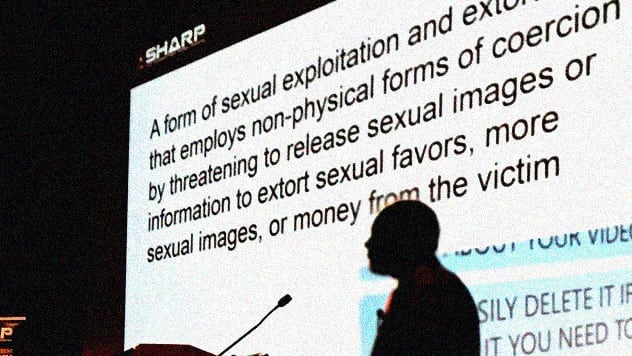You're scrolling through Facebook like any other day when a friend request pops up from a pretty girl. You accept, and she sends you a naughty picture. You send one back, just to be polite, or maybe because she asked nicely. Maybe you move the conversation onto Skype for a live show. But then she demands money, hundreds of dollars, and threatens to send your naked photo to your friends, your family and — worst of all — your employer.
Because when your employer is the U.S. government, the fallout can be severe.
Law enforcement officials have dubbed the scam "sextortion," and it happens all over the world. But American military personnel are particularly vulnerable, authorities say, because they have a steady income and their conduct is closely regulated. Hundreds of service members every year are falling into this trap, and many are handing over thousands of dollars with hopes the problem will go away — often to no avail. And now U.S. officials fear that foreign enemies could exploit the same tricks to obtain sensitive information and compromise national security.
"People ask us why we care about a service member dropping his pants and paying $200 to some foreign national," said Katherine McDonald, an intelligence specialist with the Naval Criminal Investigative Service. "The concern really is twofold: the concern of harm to themselves and, on a national security level, a lot of these service members do have [security] clearances."
Videos by Daniel Woolfolk/Staff
It's unclear to what extent sextortion scams are a concern across the broader federal government. A spokesperson for the FBI acknowledged receiving several questions from Military Times but did not provide a response to any of them.
Military law enforcement officials say they've received several hundred sextortion reports since the scam first surfaced in 2012 and that, despite ongoing efforts to warn and educate personnel, the numbers continue to rise. The NCIS alone, which investigates criminal cases for the Navy and the Marine Corps, has received about 300 sextortion reports over the last four years, officials say. In 2014 there were 60 reports. This year it's more than 120.
"Part of that, too, is that we have gotten the word out in so many different ways and encouraged reporting," said NCIS Division Chief Megan Bolduc. "I think people are more willing to come forward, but incidents are also increasing."
Many victims are the military's most junior troops, young adults away from home for the first time and trying to make new connections or otherwise find their way in the world. The criminals who target them are sometimes based in the U.S., but more often they are overseas. The Philippines and Ivory Coast, located in west Africa, are particular concerns, said Linda Card, a spokeswoman for the Air Force Office of Special Investigation, which has received about 70 sextortion reports dating back to 2012.
Army Criminal Investigation Command says its seen a "handful" of cases, but officials there were unable to provide Military Times with precise figures. All three agencies — NCIS, Army CID and Air Force OSI — are crafting broader strategy for the Defense Department.

Many sextortion scams originate overseas, raising concern among law enforcement officials that foreign enemies could use the same ploy to access national secrets or other sensitive information. (File photo)
Many of these scams start with an invite and then escalate quickly. One service member who was interviewed by Military Times recalled chatting with a woman on Adult Friend Finder, a social network that professes to "guarantee you'll get laid," before she suggested they move to Skype's live video interface.
Both undressed for their web cams. But when it was over, it wasn't really over.
The service member, a junior sailor stationed on the East Coast, was put in contact with Military Times by the NCIS agent handling his case. He agreed to share his story on the condition of anonymity. The sailor, who said this was his first time interacting with anyone like this, could not be certain whether the person he spoke to was in fact a woman because "she" said her computer's microphone was broken. Experts say extortionists often use pre-recorded video, sometimes stolen, to entice would-be victims.
The scammer demanded $150, and threatened to send the compromising video to the sailor's family and friends if he refused to pay. Experts say that's a common tactic: seeking a relatively low sum to start before demanding larger additional payments. The scam will continue as long as the target continues to pay. In at least one case involving military personnel, the sum exceeded $10,000.

Once a scammer is in possession of compromising photos or video, they usually demand money — often just a little at first, but then they'll want more. The NCIS says at least one service member was taken for more than $10,000. (Military Times photo illustration)
This particular sailor did not hand over any money. Instead, he spoke to his supervisor. "I talked to him because he’s a relatively rugged individual, for the most part. He and I got along pretty well," the sailor said of his boss. "I just felt like he’d probably know what to do or how to deal with it."
The supervisor tried to put things in perspective. "Does she really have any actual rock solid names of anybody you know?" he asked. "What are you worried about?"
The sailor reported the incident up his chain of command and then to NCIS. Within a week he had met with an agent and handed over the saved messages. The scammer did try to contact him one more time, he said, but he did not respond, and he hasn't seen that Skype account online again.
He was concerned that his video might appear online. "I searched about it a few times myself. I never found anything," he said. "I don't have a Facebook [account] or other large social media, which I think helps in that this person wasn't able to track down anybody that I knew."
Several scams start on Facebook, officials said. In fact, when the threat first surfaced, Facebook Singapore contacted NCIS to alert authorities that U.S. sailors and Marines had reported numerous Philippine-based Facebook accounts as potential scammers. In those cases, service members received friend requests and messages from accounts claiming to belong to women. They exchanged photos, and then their new "friends" demanded money.
Some of the exchanges occur over video chat. The scammer will play a pornographic video of a woman, encouraging the target to join in before revealing that the entire session was recorded.
"It can take anywhere from minutes to days to a couple of weeks, especially with the Philippines scam," said McDonald, the NCIS intelligence specialist.
Philippine law enforcement busted one such criminal ring earlier this year, she said, arresting an office of 50. The organization was somewhat sophisticated. It had a payroll and offered bonuses to employees who swindled the most money. But on the whole, sextortion is difficult to prosecute. In the Philippines, for instance, the government requires that a victim come in person to file a report.
U.S.-based scams can be more sinister. These perpetrators troll free dating sites like Plenty of Fish and MeetMe.com, Bolduc said, and the approach is usually more gradual. They'll strike up a conversation with a target, start to form what seems like a genuine relationship and only then start sending explicit pictures.
But in some cases, days or weeks later, the service member will get a call from someone claiming that the girl is underage. The caller will say "pay me or I'll tell the cops." This happened to one service member who told NCIS agents that a woman contacted him through Facebook to ask for money to help pay for her grandmother's surgery. "She sent me a nude picture and asked for one from me. She wanted to meet [and] have sex with me," the victim said, according to interview notes NCIS provided to Military Times. "After I hadn't talked to her for a while, I got a message from a guy saying I had to pay for the damage I had done."
"So now our poor service member believes that he's in possession of child pornography," McDonald said. "The guy says he is her father. He wants money to pay for mental health treatment — maybe says she attempted suicide — in exchange for not reporting it."
Then, perhaps, another man will call, claiming to be local law enforcement and encouraging the service member to pay the girl's father. Or in one case, the suspect posed as an NCIS agent, said the agency's spokesman, Ed Buice. That's when panic can set in.
"A service member who feels like they've been duped into taking their pants off and paying money is one thing, but it ratchets way up when the service member thinks that he has been sent child pornography," Buice said. "Now he's willing to do anything, and pay any amount of money, to keep his secret."
When a sailor or Marine makes a sextortion report, NCIS agents run all of the images through the International Crimes Against Children database, to ensure they don't match any known exploited underage kids. Separately, that's been a big focus for U.S. law enforcement. According to more than 600 agencies surveyed in the National Child Exploitation Threat Assessment, enticement of children online is on the rise. In late-November, a Minnesota man was sentenced to 38 years in prison after targeting more than 150 underage boys as part of a sextortion scheme.
More often than not, women are seldom involved, officials said. The photos are often stolen from Instagram or Google, and the women whose likenesses are being used won't even know their pictures are involved. Buice called these scams "scripted." It's "dinner theater," he said.
"When the scheme first came to our attention, they were using photos of active-duty female Marines to help legitimize their profiles," McDonald added. "Because if it's a fellow Marine, I'm more likely to accept that friend request."
Catching and punishing these scammers has proven exceedingly difficult. NCIS officials say that, despite all of the reports, they've been unable to prosecute even one perpetrator. So they've focused instead on prevention, telling service members to not send compromising photos or videos to strangers on the internet.
Law enforcement officials want people to know that, if they become ensnared in a sextortion scam, they should cease correspondence immediately, save all communication they've had and, above all, don't send any money.
"If these individuals pay at all, [the scammers] will ask for more money," Bolduc said. "... These perpetrators know that [military personnel] have a steady income. ... They know they get paid on the first [of the month], they get paid on the fifteenth. These perpetrators also know that they're held to a higher standard. Threatening that their career may go down the drain is terrifying to a young service member."
The sailor who spoke with Military Times said that if service members are on social media, they should refrain from posting photos of themselves in uniform. Don't list your job either, he said, and if a scammer says they can revoke a security clearance, it's likely an empty threat.
If you're going to chat with strangers online, he said, don't be so quick to get undressed. "Just try to get to know people a little better," he added. "Try to get a little more out of them before you try to do anything interesting."
Myers is a reporter with Army Times. On Twitter: @MeghannReports.
Meghann Myers is the Pentagon bureau chief at Military Times. She covers operations, policy, personnel, leadership and other issues affecting service members.





